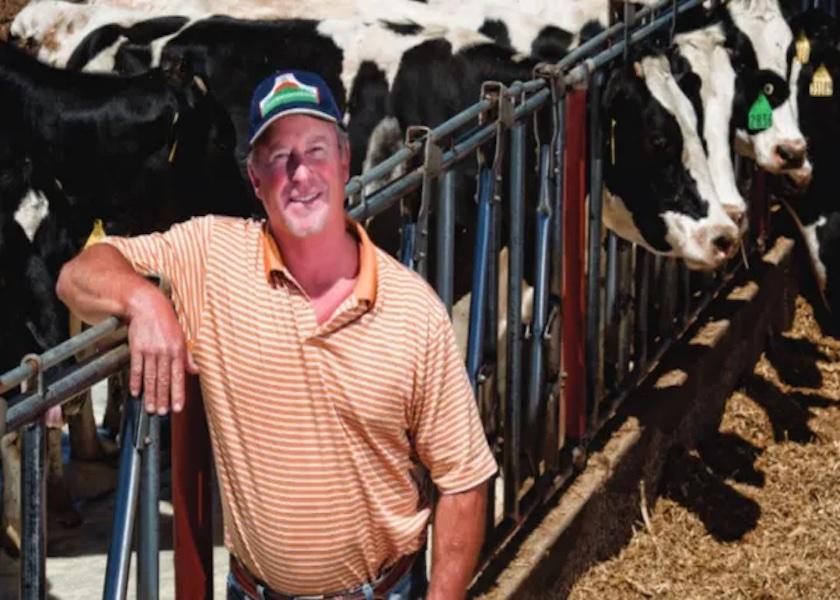Air Force Pollution Forces New Mexico Dairy to Euthanize 3,665 Cows

Art Schaap, owner of Highland Dairy in Clovis, New Mexico, has been living a nightmare for the past four years. Fortunately, it sounds like the nightmare might soon be reaching its end.
In August 2018, Schaap received word that seven of the 13 wells located on his dairy had been contaminated by toxins called per- and polyfluoroalkyl substances (PFAS.) These toxic chemicals entered the groundwater after aqueous film-forming foam, a substance used to smother flames in fire training exercises, were used at the nearby Cannon Air Force Base.
A July 2017 inspection by Air Force scientists found contamination near the Schaap dairy – an inspection that came eight years after the Air Force identified the need for such an inspection, The Guardian reports. The Air Force reported its findings to the New Mexico Environment Department, but not to the people living nearby. When the Air Force finally tested Schaap’s water on Aug. 28, 2018, it was found to be so polluted the military immediately began delivering bottled water to the family’s home. One of Schaap’s wells tested at 12,000 parts per trillion, or 171 times the EPA health advisory level of 70 ppt.
“It’s potentially been in the groundwater the whole time I’ve owned the dairy,” Schaap said.
Unfortunately, the contaminated wells provided drinking water to Schaap’s entire herd. Testing showed the cows, along with the milk they produced, contained PFAS at levels the U.S. Food and Drug Administration deemed unsafe for human consumption. With the milk deemed unsafe, Schaap was forced to dump approximately 15,000 gal. of milk each day.
“This has poisoned everything I’ve worked for and everything I care about,” Schaap told New Mexico Political Report. “I can’t sell the milk. I can’t sell beef. I can’t sell the cows. I can’t sell crops or my property. The Air Force knew they had contamination. What I really wonder is, why didn’t they say something?”
Disposing of the Herd
Four years later, Schaap’s nightmare is finally coming to an end, but not without heartache. After discovering the PFAS toxins were present in his animals, Schaap knew that someday he would be forced to euthanize his entire herd. Unfortunately, that day has come.
Earlier this month, Highland Dairy, with assistance and direction from the State Veterinarian and the New Mexico Livestock Board, humanely euthanized 3,665 cows – Schaap’s entire herd.
The current estimated cost of this loss of revenue and increased expenses is $5,946,462, which does not account for upcoming costs associated with the on-farm composting of animal mortalities and final disposal, according to a New Mexico Environment Department (NMED) news release.
News of the herd’s dispersal is not only striking a nerve with the public, but government officials as well.
“The Department of Defense poisoned Highland Dairy’s cows, and the loss is devastating and heartbreaking,” said James Kenney, New Mexico Environment Department cabinet secretary. “Rather than take responsibility for its PFAS pollution, the Department of Defense put a family farm out of business and has the audacity to continue its litigation against New Mexico – forcing New Mexicans to pay for cleanup and legal costs. As a result, we are now assisting Highland Dairy in managing dairy cow carcasses as hazardous substances and seeking input from experts on treatment and disposal options.”
NMED is the state agency overseeing Highland Dairy’s plan for disposal of PFAS-contaminated livestock, which is required for the dairy to qualify for cow indemnity under USDA’s Dairy Indemnity Payment Program. The program, which USDA expanded late last year, provides payments to dairy producers for the lost value of their herd due to contamination from livestock exposure to chemicals, such as PFAS.
Now, with the animals euthanized, a disposal plan has been set in place.
In the first phase of the plan, the dairy will compost all PFAS-contaminated carcasses on the farm. In the second phase, the dairy will conduct a PFAS analysis of the composted material and any other material to determine final removal and disposal options.
According to the NMED press release, the Highland Dairy removal plan is the first of its kind nationally for addressing PFAS-contaminated cows as a hazardous waste and was developed in consultation with the USDA Farm Service Agency, the USDA Natural Resources Conservation Service, the State Veterinarian of New Mexico, the New Mexico Department of Agriculture and NMED.
“I support NMED’s science-based approach to ensure that livestock and other agricultural sectors are safe,” says Jeff Witte, director/secretary of New Mexico Department of Agriculture. “We, unfortunately, already witnessed how PFAS contamination affected a New Mexico dairy.”
The state Environment Department says it has allocated $850,000 of its hazardous waste emergency waste for cleanup of the carcasses and associated wastes. The department estimates it has now spent over $6 million to protect communities from PFAS.
“All states are dealing with PFAS and the agricultural industry. That’s not uncommon. What is uncommon is that New Mexico has the first case to my knowledge in which 3,600 cows have been euthanized. We’re treating PFAS like it should be treated, a hazardous waste,” Kenney says.
While steps are being taken to help resolve this contamination issue, it doesn’t take away the fact that lives were impacted by the chemicals used in training exercises at Cannon Air Force Base.
“Cannon Air Force Base knows what they have done to the groundwater,” Schaap says. “They expect military personnel to have integrity, but what they are doing to the Clovis community and the farms near the base does not demonstrate integrity. They need to own the pollution.”







